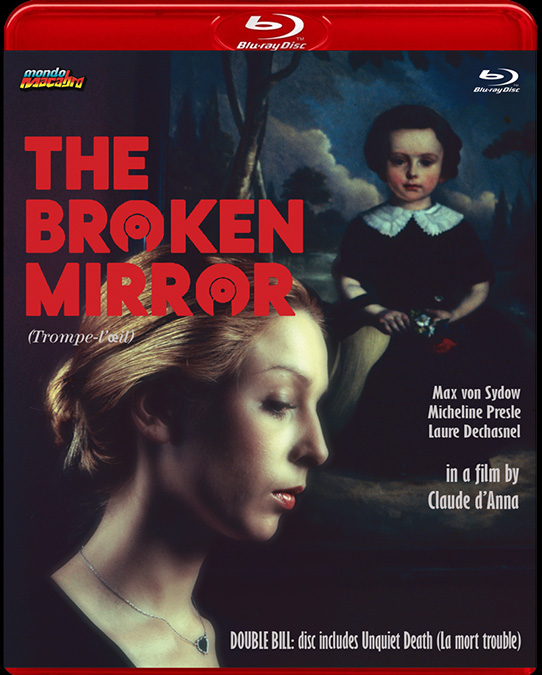Anne (Laure Dechasnel) is an art restorer and a barrel of laughs! She’s pregnant with her first child and her husband Matthew (Max von Sydow) and her mom (Micheline Presle) don’t understand why she’s so miserable. They’re concerned about the health of the baby as well as Anne’s mental health. It’s only been a few weeks since Anne, during a blackout, just disappeared from their home only to reappear on a park bench clutching a painting with no memory of where she’d been. As her mind continues to deteriorate, Anne becomes more and more distant and despondent. Then the cryptic but threatening letters start showing up. And just the who the heck is that 19th Century-lookin’ creeper in the next door window who’s always watching Anne?
After watching The Broken Mirror (1975), I just wanted to go up to pregnant women and apologize, because Laure Dechasnel’s performance of Anne really, really makes carrying a little parasite around in your belly seem like the single most depressing thing that can happen to a person. Dechasnel’s Anne is this muted and zombielike character whose pain and loneliness only bubbles to the surface when no one is around. Her character is not easy to like (to say the least) as she can’t or won’t articulate what she really needs. So, Anne just pushes it all down and retreats from those who care about her (even though they are, you know, assholes). I like when a moody character study goes in directions I don’t expect AND isn’t over two hours long!
The music score by Alain Pierre is quite elegant with some lovely string arrangements that will often devolve into freaky synthesizer drones when things get intense. It pairs perfectly with the breathtaking camerawork by Dutch cinematographer Eduard van der Enden. You won’t believe your eyes when you see how wonderful the shots in The Broken Mirror are framed. There are so many painterly moments during the running time of this film that it’s just astonishing. The sets have been painted with dark reds and greens that give the shots the look of the work of the Renaissance masters.
The Broken Mirror is an engrossing piece of quiet dread and isolation. Director Claude d’Anna seems to have put great care into this film. Everything feels so deliberately executed. The pace is slow but this lets Anne’s unhappy, yet beautiful world get into your head. For everyone around her, she is the woman who has everything, but for her, her life is a prison sentence. As Anne’s surreal dreams seem to be turning into reality, the film gets more and more mysterious before the last moment when all is (maybe) revealed.
The second feature on this disc is Unquiet Death (1970). It tells the story of three spoiled daughters stuck on an island after the death of their wealthy father. With only their deranged manservant as company, the girls lose their minds after hearing on the radio that society in the outside world has broken down. And that’s pretty much it for a very, very long 76 minutes. Claude d’Anna directed this with Férid Boughedir, and for some reason, they agreed to allow Mondo Macabro to release it on Blu-ray.
All I’m saying is that sometimes going farther back into a director’s filmography is a bad idea. Unquiet Death might work for some viewers that enjoy arthouse cinema, but this one feels like a film school final project stretched out to at least twice as long as it needs to be. Moments of beautifully composed images and a group of actors going full tilt with increasingly outlandish behavior is cool and all, but I found this film insufferable.
Mondo Macabro brings this part of films to Blu-ray and the results are incredible. Video and audio for both The Broken Mirror and Unquiet Death are superb. Both the English dub and the French audio (with English subtitles) on The Broken Mirror sound great. Unquiet Death doesn’t have an English dubbed option, but the film has English subtitles. The extras on the disc feature interviews with director d’Anna and co-director Boughedir. A very interesting interview with actress Laure Dechasnel, who talks about working very hard on the character of Anne to bring her to life. There is a profile on editor/producer August Verschueren and a short film by d’Anna.

